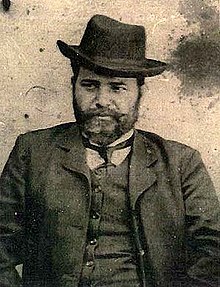Petar Pop Arsov
| Petar Pop-Arsov | |
|---|---|

revolutionary
|
|
| Born |
August 14, 1868 Bogomila, Ottoman Empire |
| Died | January 1, 1941 (aged 71) Sofia, Bulgaria |
| Nationality | Bulgarian |
Petar Pop-Arsov (Bulgarian: Петър Попарсов) (August 14, 1868 in Bogomila, present day Čaška Municipality, Republic of Macedonia – January 1, 1941 in Sofia, Bulgaria) was a Bulgarian revolutionary from Macedonia, one of the founders of "The Committee for Obtaining the Political Rights Given to Macedonia by the Congress of Berlin" from which, as Petar Poparsov says in his writings, later developed the Internal Macedonian Revolutionary Organization (IMRO), known prior to 1902 as Bulgarian Macedonian-Adrianople Revolutionary Committees (BMARC). His last name is sometimes rendered 'Poparsov' or 'Pop Arsov'. Scholars consider him a Bulgarian while in the Republic of Macedonia he is regarded as an ethnic Macedonian.
He was born in 1868 in the village Bogomila, near Veles. He was one of the leaders of the student protest in the Bulgarian Men's High School of Thessaloniki in 1887/1888 where the main objective was to replace the East Bulgarian dialect with a Macedonian dialect in the lecturing. As a consequence, he was expelled along with 38 other students. He managed to enroll in the philology studies program at Belgrade University in 1888, but because his resistance to Serbianisation, he was once more evicted in 1890.
In 1891 he is one of the founders of Young Macedonian Literary Society in Sofia and its magazine Loza (The Vine). The purpose of the society was twofold: the official one was primarily scholarly and literary. One of the purposes of the magazine of Young Macedonian Literary Society was to defend the idea the dialects from Macedonia to be more represented in Bulgarian literature language. The articles where historical, cultural and ethnographic. The authors of this magazine clearly considered them as Macedonian Bulgarians, but the Bulgarian government suspected them of the lack of loyalty and some separatism and the magazine was promptly banned by the Bulgarian authorities after several issues.
...
Wikipedia
